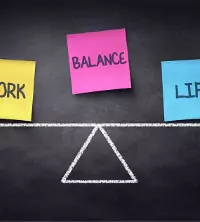
Your alarm goes off, signaling it’s time to get up and prepare to start the day. Yet, do you find yourself continually hitting the snooze, not wanting to get out of bed? When you think about the workday ahead, are your thoughts filled with dread, stress and anxiety about everything you need to accomplish? When you finally make your way into the office, are you tired, distracted, and have trouble starting and finishing what were once simple tasks?
Here’s the bad news: if any of this resembles your daily experience, there’s a good chance you’re dealing with work burnout. However, there’s good news: with some stress management techniques you can do yourself, and assistance from counselors like those at Chapin & Russell Associates, your burnout can be managed and overcome! Allow Chapin & Russell Associates to explain how:
What Exactly is Work Burnout?
While everyone encounters stress and processes it differently, work burnout is more specific and persistent. It arises from a combination of work-related factors and concerns that lead to fatigue, loss of interest, and difficulty performing tasks. If not addressed, burnout can escalate into serious mental health issues, such as depression and anxiety, eventually affecting physical health.
Work burnout can be more easily identified as three different types: under-challenged, neglect, and overload burnout.
- Under-Challenged Burnout – If you feel bored at your job or unappreciated for the work you do, this can culminate in a sense of frustration about the direction of your career. You might also feel you aren’t completely utilizing your entire range of skills and abilities or that your talents can be better applied elsewhere.
- Neglect Burnout – If you lack the proper tools or support system to do your job confidently, you can feel stressed and helpless. Not being given proper guidance or direction at work can make meeting daily work demands and deadlines challenging, negatively impacting your motivation and work performance.
- Overload Burnout – The opposite of neglect or under-challenged burnout is overload burnout. You can quickly become overwhelmed if you have too much on your plate, and constant work demands are too much for you to bear alone. This type of burnout tends to lead to feelings of exhaustion, both mental and physical.
How Can You Identify Work Burnout?
Although there’s plenty about work to feel stressed over, not every stressful scenario is a precursor to work burnout. However, if you know the specific signs of work burnout and some of its primary symptoms, it’s easier to pick it out from your standard, “run-of-the-mill” stress. That way, you can mitigate burnout early on before it progresses to an advanced state and begins impacting your personal life. Here are some common symptoms you can use to help identify work burnout:
- Persistent feelings of tiredness and a lack of energy
- A marked decrease in motivation, enthusiasm, or interest in your work and personal achievements
- Development of negative attitudes toward your job, feeling disillusioned or lacking a sense of accomplishment
- Feeling disconnected or isolated from work colleagues
- Challenges remembering tasks or focusing on work
- Heightened irritability to small annoyances that previously seemed minor
- Noticeable changes in your eating habits
- Physical ailments, such as headaches, muscle tension, or digestive issues
What Are Some Ways to Manage Work Burnout?
As debilitating as work burnout can be, there are effective ways to manage it. Although many factors impacting burnout can seem outside your control, it’s a matter of doing the best you can for yourself. From engaging in new activities to seeking the support of friends, family and coworkers, you can do plenty to mitigate the most severe effects of work burnout. Here are a few burnout coping recommendations from Chapin & Russell Associates:

- Set Boundaries for Yourself – If you have difficulty detaching yourself from work after heading home for the day, it’s crucial to set boundaries for yourself. Start by separating work time from personal time. Don’t let work matters intrude on your downtime, and give yourself the necessary space to recharge and recuperate.
- Prioritize Self-Care – Getting caught up in the stress of work can lead you to neglect your own care! As such, it’s crucial to prioritize your needs first to ensure you’re happy, healthy and active. Regular exercise, proper nutrition, and adequate sleep are all essential components of maintaining self-care.
- Try Relaxation Techniques – Techniques like mindfulness, meditation or yoga can help you relax your mind and body, control your thoughts, and reduce stress. Engaging in some of these relaxation techniques can cut through the stress and increase your overall well-being.
- Take Regular Breaks – It’s time to walk away from your keyboard, remove the name tag, and breathe. Allowing yourself time throughout the day for short breaks, even a few minutes, can effectively clear your mind, refresh your motivation, and improve your productivity.
- Discuss Burnout with Your Supervisor – We understand this can be a difficult conversation to have, but it’s necessary if your burnout doesn’t improve. Talk with your supervisor about your current workload and stress levels and what can be done to take some of the load off or provide extra support.
- Do What You Love – If you have difficulty finding enjoyment in your work, there are other avenues where you can feel energized or fulfilled. Engage in your favorite hobbies, commit to exercise, or talk with your friends. The more fun and worthwhile activities you make part of your routine, the better your mood will be.
- Seek Professional Help – If you still find overcoming work burnout challenging, don’t hesitate to reach out to mental health professionals. Counselors like those at Chapin & Russell Associates can help you create effective strategies to cope with burnout and its causes.
- Neurofeedback Training – Advances in brain science, quantitative electroencephalography (QEEG) and computer technology have shown it’s possible to retrain your brain to better manage burnout and its debilitating emotional, behavioral, and cognitive consequences. Chapin & Russell Associates can provide our clients with neurofeedback training for burnout.
Don’t Let Burnout Control Your Life
There’s no reason you ought to continue battling against the challenges presented by work burnout when there are ways it can be controlled. If you need help devising a plan to tackle your work burnout, schedule a counseling session with the mental health professionals at Chapin & Russell Associates. We’ve helped countless individuals overcome the daily stressors that impact their work and life through dedicated, effective psychotherapy. To learn more about burnout and how it can be treated, contact us at 309-681-5850.


